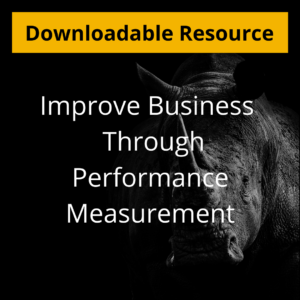Aside from providing solutions to customers, a business’ major focus is to remain competitive in the market. For this reason, business leaders need to ensure that their business is operating effectively and efficiently and is performing to the optimum standard.
Measuring performance is vital to an organisation’s survival and success. It serves to identify a business’ status in terms of growth, progress, results and goal attainment.
Benefits of Measuring Business Performance
Performance measurement is a powerful management tool that should be used with strategic purpose and intent. When done correctly, measuring business performance allows managers to:
- Assess how each section of the business operates
- Detect inefficiencies in existing processes
- Identify business areas and processes that need improvement
- Track the progress of organisational targets
- Proactively manage capabilities and results
- Develop strategies for growth
How to Measure Business Performance
A business must have a clear understanding of its key business drivers and must employ the right measuring system to gauge its operational performance. Below are the steps needed to measure business performance:
1. Set goals
The primary step in managing business performance is setting performance goals and targets. Clearly defined goals provide a way to measure success and keep track of your progress. They also help ensure that everybody in the business is headed on the right path to reaching these targets. Business goals can be short and long-term but generally encompass the following:
- Enhance lead generation
- Increase sales and profit margin
- Reduce expenses and inefficiencies
- Improve customer service
- Increase website traffic
- Grow market share
- Increase brand awareness
- Minimise staff turnover rates
- Enhance recruitment pipeline
The explicit goals that are set serve to measure and improve the business performance process.

2. Establish Key Performance Indicators
Once you’ve set out your goals, you will need to narrow down and identify your Key Performance Indicators (KPIs).
“Key Performance Indicators (KPIs) are the critical (key) indicators of progress toward an intended result. KPIs provides a focus for strategic and operational improvement, create an analytical basis for decision making and help focus attention on what matters most.” – KPI.org
A KPI is a measurable value that demonstrates how effective a business is at achieving its goals. But, in order to be effective, a KPI must be:
- Well-defined
- Quantifiable
- Actionable and achievable
- Analysable
- Communicated
Because there are countless KPIs to choose from, business leaders must ensure that the ones they select align with their unique business goals and are relevant to their organisation and industry.
Some common KPIs include:
- Number of newly acquired customers
- Sales quota attainment
- Total sales volume
- Gross and net profit
- Market share percentage
- Operating cash flow
- Return on Investment (ROI)
- Conversions from advertising
- Traffic to lead ratio
- Net Promoter Score (NPS)
- Customer satisfaction score
- Number of customer complaints
- Average retention rate
- Order fulfilment times
- Employee engagement
- Staff turnover rate
3. Measure KPIs
Nowadays, measuring performance indicators can be easily accomplished with the use of dashboard applications. Once the KPIs have been established, management must determine the measurement frequency and establish monitoring schedules.
The frequency of measurement can be weekly, monthly, quarterly or yearly. It ultimately depends on:
- The nature of the goals (short or long-term)
- The established timeline for goal attainment
- The rate of data collection
- The comprehensiveness of the collected information
- The metrics and resources required by the organisation
- Whether one set of data informs another or is linked to a larger goal
Performance management is indispensable to viable organisations. It assists in setting targets, tracking progress and improving strategy. Hence, to maintain success and advance growth, all businesses need to diligently monitor and measure their performance.
If you’re looking to improve your business’ performance but aren’t sure how or where to get started, connect with our team of experts to schedule a consultation.

